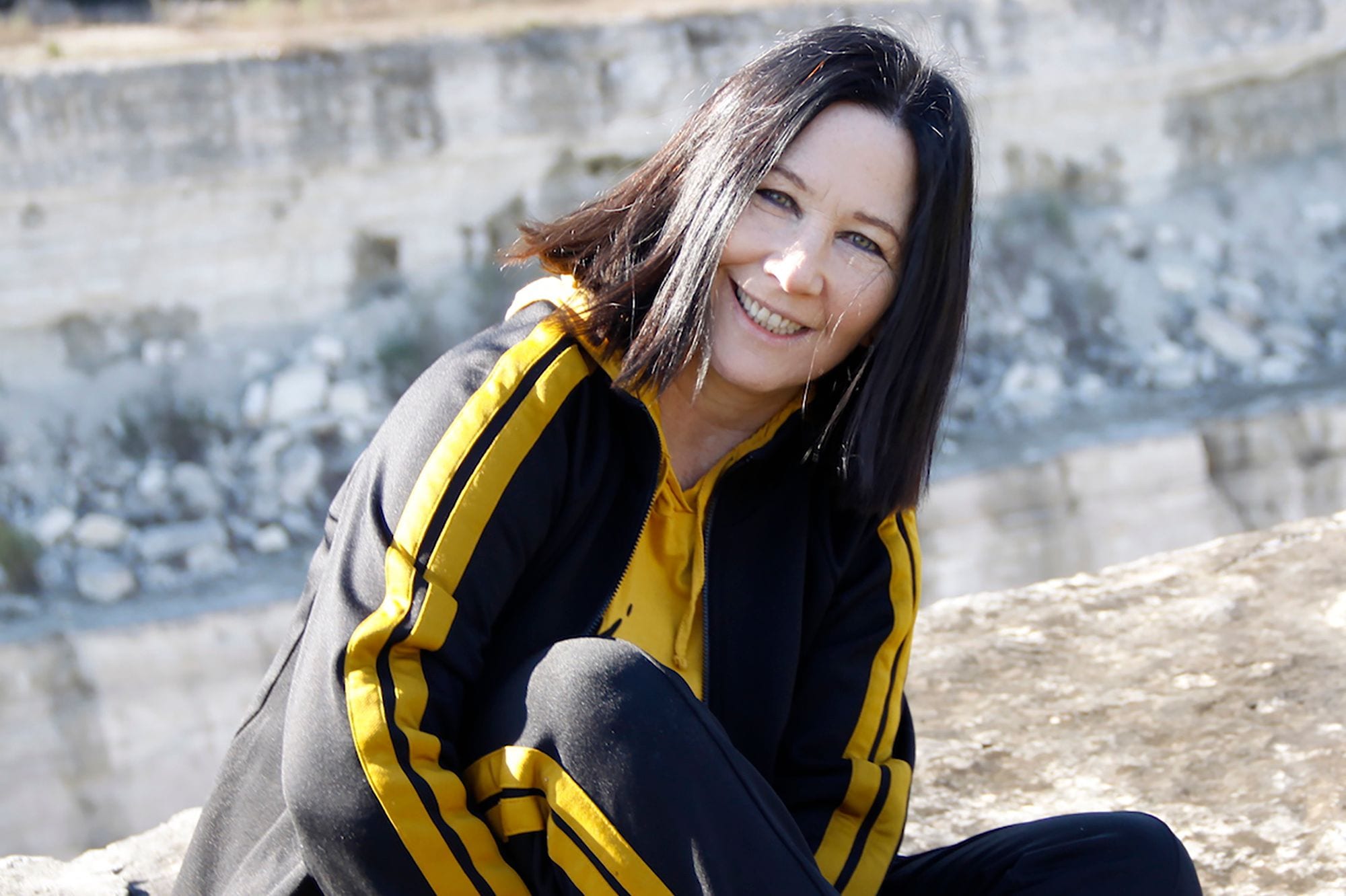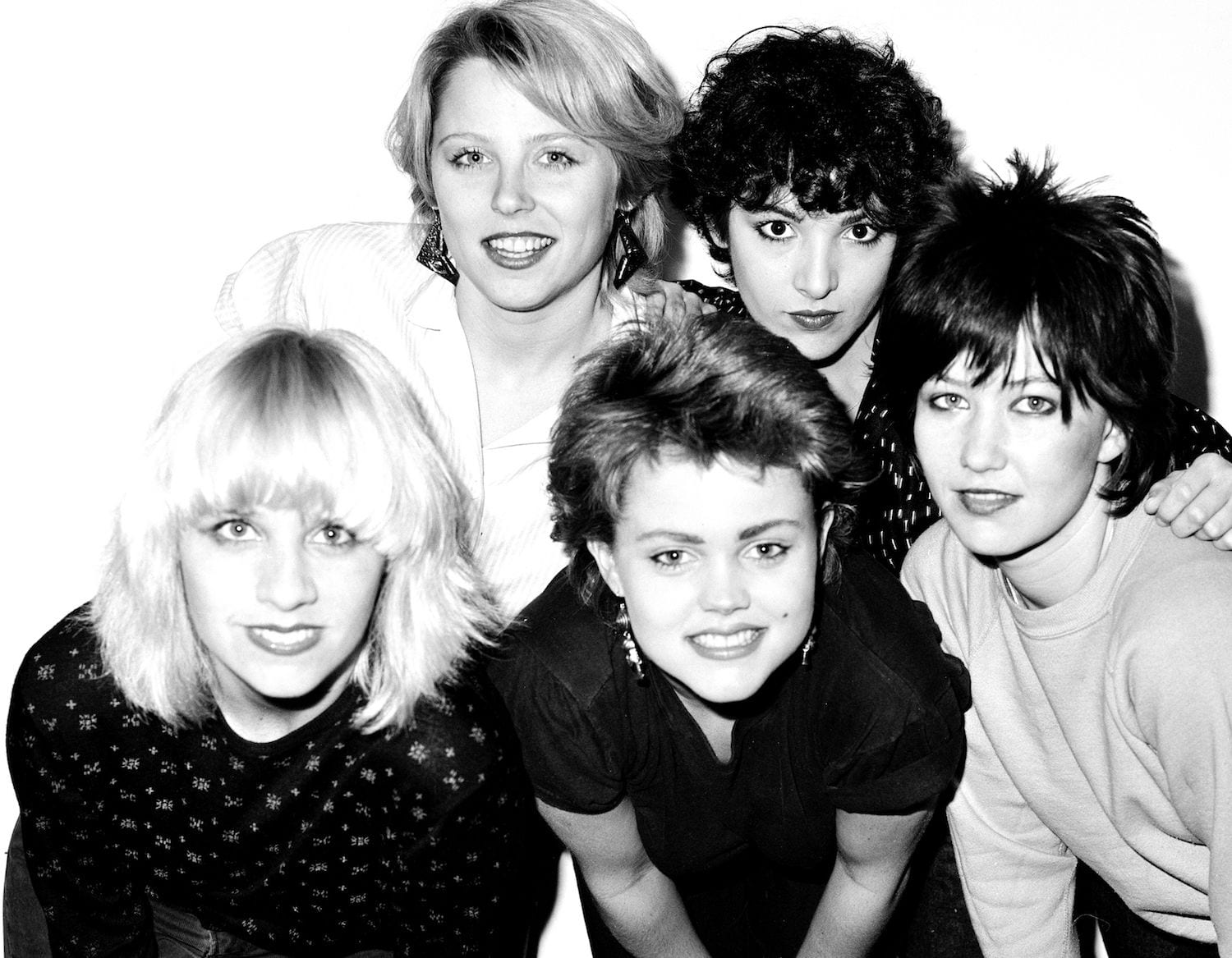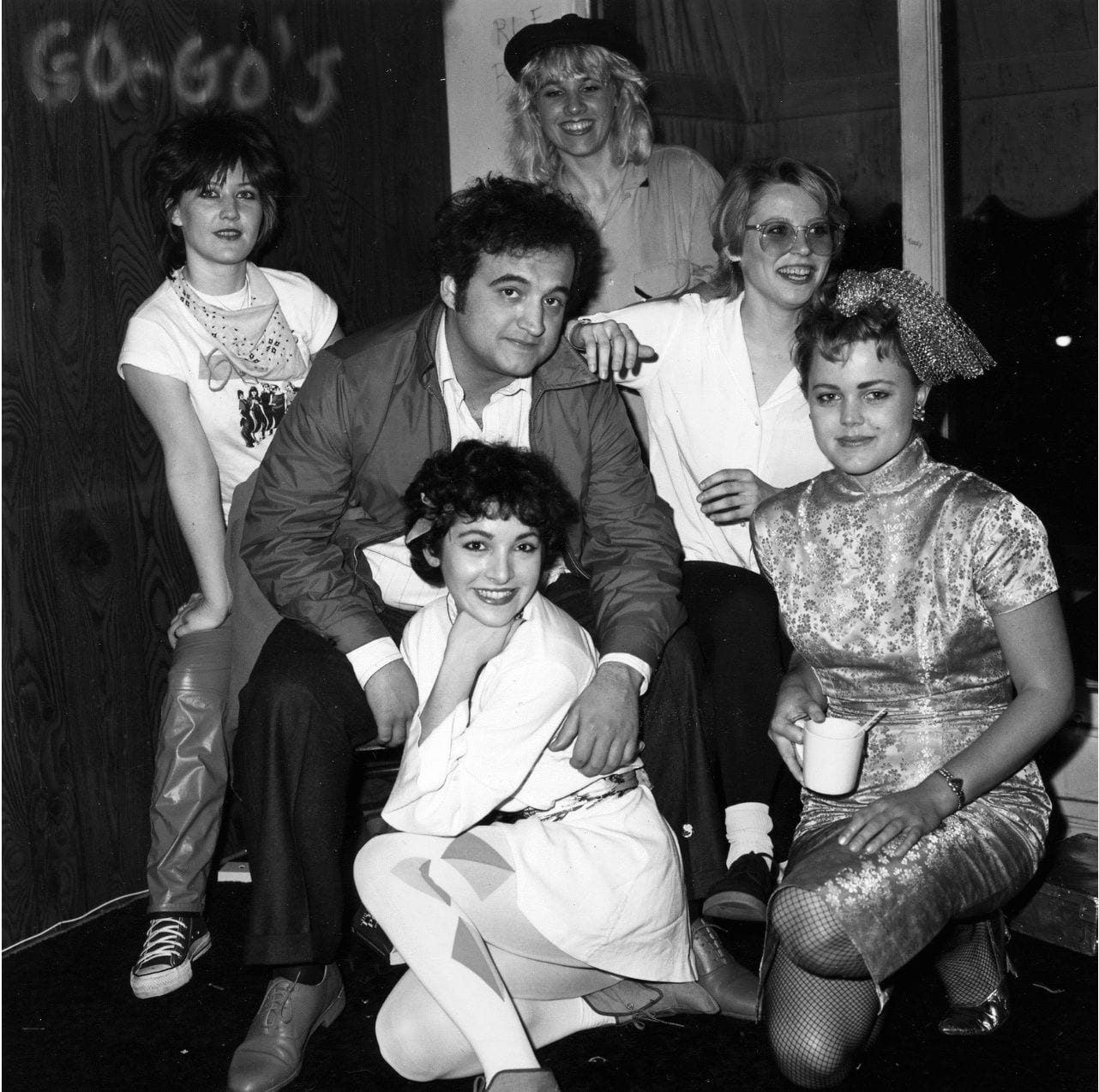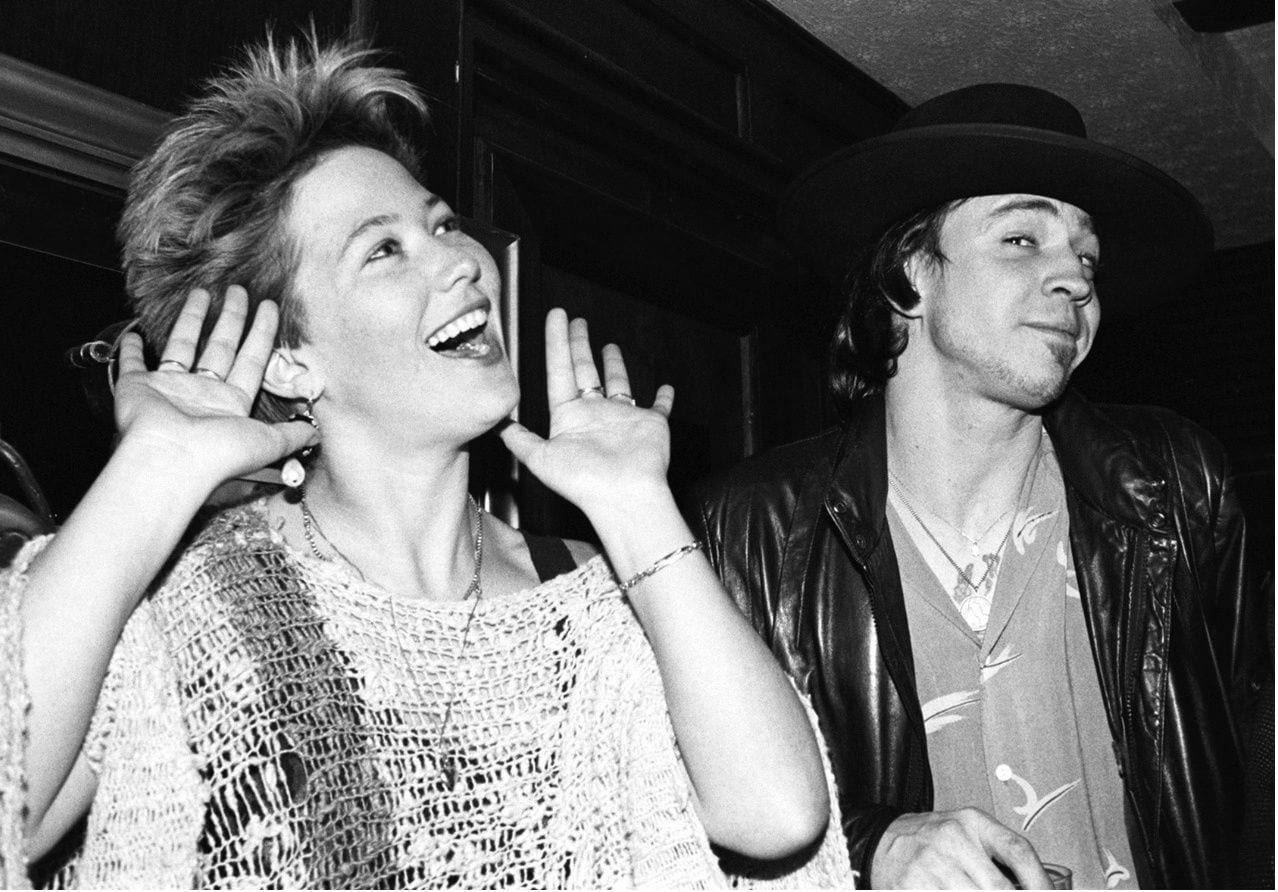
Kathy Valentine left her childhood home in Austin, Texas, to seek fame and fortune as a rock ‘n’ roll star, and struck solid gold after she joined the all-female Go-Go’s as a full-time member in January 1981.
By the time she moved back to Texas’ capital city in 2006, Valentine was the 47-year-old mother of a three-year-old daughter. By then having experienced enough sex, drugs, booze, and rock ‘n’ roll to last a century, the recovering alcoholic 17 years into her sobriety went on to embrace a calmer but richer lifestyle with what she calls her “real” family.
So how did a Go-Go’s girl gone wild in the ’80s finally find what she was looking for? That’s a compelling question, and Valentine’s riveting new book that was released on 31 March, All I Ever Wanted: A Rock ‘N’ Roll Memoir provides a few clues.
Cordial and candid during a marathon phone interview, the spiky-haired bass player and rhythm guitarist of the Go-Go’s throughout their long but roller-coaster relationship seemed — despite recent events — at ease and ready to reveal more. Chatting from her home on 25 March, with the coronavirus pandemic crippling the world, Valentine was adhering to a shelter-in-place order that meant giving up drives to Starbucks. Yet she was feeling blessed that her daughter Audrey, now 17, was at home preparing for high school online classes. “It’s just funny how every day is a little bit less normal,” Valentine says. “And yet the weather is just gorgeous, you know? So there’s that. I’m grateful for that.”
Just nine days earlier, Valentine had to postpone the upcoming launch events for All I Ever Wanted, the book published by University of Texas Press accompanied by an intriguing soundtrack with song titles such as “Liquid Forget,” “Bash & Crash” and “Shrinking, Sinking” named after various chapters. “I was really excited because I’ve never really gone out on my own and done something [like that],” offers the first-time author, who was hoping to perform songs from her soundtrack made with her boyfriend, Mikel Rouse. Now she’s finding creative ways to hold some online events on Zoom with fans and readers.

Android Face by bluebudgie (Pixabay License / Pixabay
On this day, the Go-Go’s volatile history could have been the elephant in the room. But Valentine was forthcoming, willing to share their good and bad times.
After a show at the Whiskey a Go-Go on New Year’s Eve 1980, when she was asked to fill in for original bassist Margot Olavarria, Valentine soon became a permanent member of what became the first all-female band not only to write and play their own songs but also climb to No. 1 on the Billboard 200 albums chart en route to multi-platinum sales. There were also sold-out shows at major venues, including Red Rocks, where I saw them in August 1982, when the crowd sang “Happy Birthday” as lead singer Belinda Carlisle was turning 24.
Emotional Reunion
Along with the success, though, there were lawsuits, breakups, financial entanglements, excessive alcohol/drug use and general discord that made them salacious Behind the Music fodder on VH1. And their third album — 1984’s Talk Show — failed to capture the magic of that Beauty and the Beat monster debut in 1981 (with mega-hit “Our Lips Are Sealed”) and the follow-up Vacation in ’82 (with the title track’s original version written by Valentine when she was with the Textones).
All seems well with the Fearless Five now as Valentine, Carlisle, lead guitarist/keyboardist Charlotte Caffey, rhythm guitarist Jane Wiedlin and drummer Gina Schock await the wider release of a documentary film that premiered at Sundance in January. Valentine calls The Go-Go’s, directed by Alison Ellwood, “a really great love letter to the band” that was much-needed.
The quintet saw the final cut with an audience at Sundance, then shared hugs on stage before participating in a Q&A, perhaps wondering when they would see each other again. “It was very emotional. We felt like the good parts of our story hadn’t really ever come across [previously]. So it’s just wonderful to have this documentary come out where it celebrates the joy. And my book I think does, too,” says Valentine, calling those early years “one of the most joyful times in my life.”
For various reasons, including physical injuries, Caffey’s pregnancy and an official parting of the ways with Valentine in 2013 due to “irreconcilable differences”, the five core members have not played a Go-Go’s show together since May 2012. Valentine missed a major tour that year after suffering a broken wrist in August that required surgery, and her friend Abby Travis became what was termed a temporary replacement.
An announced 12-show tour this summer has yet to be postponed or canceled, but if they can’t perform, Valentine hopes those dates will be rescheduled. In the meantime, she’s staying upbeat and positive about this group of survivors, detailing the reasons for their longevity and popularity.
“Despite doing, having nothing really, we can book a tour and sell it out,” Valentine says. “And that’s because the music holds up. That’s because people still enjoy seeing the band. Five women up there just playing these songs, and they’re still good, they’re still relevant, they still sound good, and there’s something about our chemistry and the way we make people feel that just keeps… it doesn’t go away,” Valentine says. “So that’s the trick. It’s like if the Ramones were alive and they decided to do a tour, it would be the same thing.”
While the primary focus of what she calls “a coming-of-age story” is on Valentine’s years with the Go-Go’s, the book also covers other aspects of her life from ages 11 to 30. There’s her discovery of rock ‘n’ roll in 1970s Austin, followed by affairs, relationships, drug and alcohol use, enriching encounters with musical heroes (Suzi Quatro, David Bowie, Keith Richards, Jimmie and Stevie Ray Vaughan) and shining stars (John Belushi, Jodie Foster), and one harrowing home invasion in Los Angeles.
But it all began with her days as a wild child raised by a single mother “who allowed anything”.

Photo: Christopher Durst
Mother Valentine’s Day
“Pushing myself out to the forefront at 61 is exhilarating and fun and frightening and exciting and really fulfilling,” Valentine says of her latest project. She also admits the experience was cathartic. “Very much so. I’d say it was probably the most intensive and cheapest therapy that I’ve ever had,” Valentine says, laughing. “And there were a lot of times where I would just be crying, sobbing.”
“It’s really opened my heart to my mom,” Valentine acknowledges. Margaret Valentine was 21 when her daughter Kathryn was born on 7 January 1959, in Austin. “And not only did I see clearly her failings, especially as a mother, what I feel like she did very badly and very wrong, it also gives me a lens where I saw what was good.”
Margaret also lives in Austin, a brain tumor survivor and independent woman who, according to Kathy, might be “a little too independent” during this pandemic crisis. But this supportive mom felt comfortable regarding how her upfront daughter handled their relationship in the book. “It was more important to her that I write my story than [make] her look good,” Valentine says before turning back to her youth. “I always felt loved, even though I didn’t always feel safe all the time. … I was never told, ‘Oh, you can’t do that. You can’t be a musician. That’s silly.’ So those are big pillars of parenting, too.”
For the Record
Sharing common interests of artists who were in her book such as punk pioneers X, Phil Seymour (who gave Valentine “my first big break” by including her song “We Don’t Get Along” on his solo debut album) and the Tourists’ Dave Stewart and his musical partner billed as “Ann” Lennox before Eurythmics, Valentine mentioned that the Textones once opened for the Tourists, recalling they covered “I Only Want to Be With You”, Dusty Springfield’s first big hit.
She also gave thumbs-up to X after seeing John Doe, Exene Cervenka & Co. on a recent tour, but couldn’t remember the name of the other act on the bill, humming the melody of a song that turned out to be “Blister in the Sun” by Violent Femmes. “I hate how I keep forgetting stuff,” she exclaims with a laugh. “I want to say Guided by Voices, but it’s not them. … Well, whatever. So X was fantastic.”
They all had something in common with the Go-Go’s — the 1980s. “I love that when you hear the Go-Go’s music, it doesn’t necessarily sound ’80s,” Valentine contends. “It might not sound real modern, but it doesn’t sound dated. It’s weird to me that the ’80s were so long ago.And it’s weird to me that I’m part of nostalgia now.”
Battle of the Bands
Female singer-songwriters of groups from another generation are showing some love for current projects by a grateful Valentine and the Go-Go’s. Bikini Kill’s Kathleen Hanna appeared in the documentary and Throwing Muses’ Tanya Donnelly and the Breeders’ Kelley Deal are planning to participate in the book tour.
When going back to the ’80s, though, Valentine might have second thoughts about bringing up another band in All I Ever Wanted — the Bangles. Seeing the rival quartet led by Susanna Hoffs and Vicki Peterson on the cover of Rolling Stone in the mid-’80s after the Go-Go’s first major breakup, Valentine wrote, “I read the cover story, incensed about how they gave no credit to the Go-Go’s for kicking the fucking door down and making it easier to convince a big label to sign an all-female band.”
Asked about that passage, she sounds a bit remorseful. “I probably should have gone deeper into that,” Valentine confesses. “Because I get it. They were so sick of being compared to the Go-Go’s constantly. So I don’t blame them for that. In fact, I’m really good friends with the Bangles.”
She mentioned sitting in with them for a gig in 2015 that included several bass players, and speaking with Peterson after sending a book, telling her, “I hope you didn’t take that the wrong way.” “And she’s like, ‘No, no, no. I totally get it. We were the same way. We were kind of annoyed with you guys.'” That tickled Valentine, but there’s no doubt the two bands were competitive back in their heyday.
In a 2007 interview with the Las Vegas Review-Journal, Hoffs looked back at those years, saying, “There were very few female bands. It was the Go-Go’s and us, basically, so we were always compared to each other. That was sort of interesting because we kept saying, ‘Well, yeah, but why don’t you compare us to, I don’t know, R.E.M., a band that came out of the garage, was guitar-based, jangly, a combination of folk and pop?’
“I’m not saying we’re like R.E.M., but why was the comparison always to the Go-Go’s?” she added, “I get the gender aspect of it, but the deeper musical thing was always sort of obscured.” Valentine gets the last word in this battle (at least for now), pointing out that the Go-Go’s and Bangles once played “a super-cool gig” in Las Vegas (Prime Time Tour, 15 August 1984, at Caesars Palace). Asked who opened the show, Valentine, without a hint of vindictiveness, says, “I think they went first.”

Photo: Janette Beckman / Published with permission from the University of Texas Press
Becoming a No-Go
As thorough and colorful as the passages in her book, Valentine covered a lot of ground during this lengthy interview, even while cleaning up in the backyard at one point. (“I’m a multitasker,” she boasts.)
The Go-Go’s didn’t even come up during the first 20 minutes until Valentine was asked about contacting all of the book’s primary subjects before publication. She alerted “everyone” via email about reviewing the excerpts in which they were mentioned, giving them the option to revise, delete, or (except in the cases of well-known figures) provide a pseudonym.
None of her Go-Go’s bandmates asked to read a sneak preview, according to Valentine. “They’ve all read it now,” she says. “But no one read it beforehand, which was scary, but at the same time, it was nice to be trusted. Except for, you know, we have a difficult history from about 2012 to 2018, when I got back in the band. There had been some pretty ugly shit happen.”
It was in 2012, Valentine writes in the epilogue, that “the wrong history repeated itself and I became the fired bass player. It was undoubtedly the worst and ugliest era in this decades-long five-way relationship.” According to a 33-page complaint filed in May 2013, Valentine was notified by Carlisle via email in January 2013 that because of “a variety of reasons … we no longer wish to work with you.”
Agreeing to discuss her departure, which we did at the end of our interview, Valentine preceded it by saying, “We’re in such a good place, I don’t like to dwell on it at all, but there is some weird conception that gets reported that I quit and sued the band. And I don’t mind taking the opportunity to say that is not what happened.
“I did not quit. I was fired from the band. And the only reason I sued was because it’s one thing to be fired, but it’s another thing when 35 years of what you’ve built. It’s like it was a business interest of mine. It’s settled, and everything was, for my part, pretty OK except for the fact that I really missed being in the band. I took it personally to a degree, but I also knew that I was kind of being the whipping boy for a toxicity and dysfunction that was kind of in our DNA.”
Valentine says she didn’t gang up on others who previously “had been on the hot seat with a target on their head”, so it hurt when “nobody stood by me —nobody”, during “easily the most devastating, awful thing I’ve been through”.
By the Book
Choosing then to look on the bright side, Valentine enjoyed spending time at home with Audrey and, while taking college classes, started thinking about writing a memoir around 2013-14. On a panel at the Texas Book Festival, she was approached by Gianna LaMorte from UT Press, and a deal was eventually done.
Knowing it was “a big endeavor,” Valentine struggled to develop a writing process. “What are the three Ps?” she asks. “Perfectionism, procrastination, and paralysis. Yes, I had all of them. (laughs) But I powered through.”
The new author is a survivor, all right. She’s also a realist who pondered a question about what could have been if Wiedlin hadn’t upset the applecart by leaving the Go-Go’s in October 1984. The group forged ahead until 9 May 1985, when Valentine felt blindsided as Carlisle and Caffey decided to break it up. Still, those five key members have reunited for tours, recordings, and other projects over the years.
“I think we were kind of doomed,” Valentine states. “And one of the things I had to let go of was that… I wanted to be in a band, an all-female band that was up there in the echelons of all the culturally important bands that have longevity, anyone from U2 to Foo Fighters to the Stones to the Who. I wanted there to be an all-female band that was up there, that grew and changed and did 20 albums over their career. And I had to accept that the Go-Go’s were just what we were. And we were never gonna be that. I wanted to be in a band that was that. I still thought that we could be that. At that time, I was like, ‘OK, Jane’s gone, but maybe it’s a catalyst to us changing and growing.’ Instead of realizing that our chemistry was irrevocably gone and broken, I just thought, ‘OK, well, maybe we’re just gonna enter a new chapter.'”
If it’s time to pass the torch, Valentine is rooting for current girl groups like the Beaches from Toronto and dynamic duos such as England’s Bones UK and L.A.-based Deap Vally. “Good stuff, it doesn’t matter when you discover it,” says Valentine, who was attracted to jazz in the ’90s and became a recent fan of hip-hop artists like Tyler the Creator and Frank Ocean. “Music is just like if you give it the time and the effort, it’s kind of wonderful because it can span eras and it can always open you up. It brings people together in a way that nothing else does these days.”

Photo credit: Janette Beckman / Published with permission from the University of Texas Press
No End in Sight
Even if the Go-Go’s can no longer be that, sustaining a relationship with her bandmates is the hope for Valentine, who concludes the book’s epilogue with three words: “Not the end.”
“I do have another memoir in me. Yeah, there’s a lot more story to tell,” promises Valentine, who as a teenager left Greenbriar Community School in Bastrop, Texas, to attend Austin Community College for two semesters … until she was asked to provide her high school transcripts.
Now three courses shy of a college degree after first resuming her education in the ’90s, the writing bug might delay Valentine’s plan to earn a Master of Fine Arts. “I will revisit the memoir format because I think I did it well,” she says. “But I want to kind of see if I can do other things well, too. …
“It’s a lesson that you don’t really learn until you get older, but sometimes the stuff you want more than anything isn’t really what you need to be a fully realized and content human,” adds Valentine, who is considering writing a book of short stories and another on women in music. “I’ll probably always play in a band as long as I’m physically able.”
Yet topping her list of proudest moments that includes what the Go-Go’s accomplished and learning in the ’90s to become a proficient electric guitarist armed with a 1962 Stratocaster, Valentine states her dual book/soundtrack effort is “the most ambitious and best thing I’ve ever created in my entire creative life.”
Not that she needed to be reminded, but 31 years of sobriety is another noteworthy achievement. “Oh God, yeah! Yeah, I don’t mean to take that for granted at all,” Valentine proclaims. “It’s just everything. It’s the foundation that I walk on. I would not have an amazing daughter. I would not still be in the Go-Go’s. I would not still be alive.
“When I got sober, I had the emotional maturity of a 16-year-old. Maybe even a 15-year-old. (laughs) I was behind on the curve in terms of being a mature person. In sobriety, I’ve gotten to grow up and be someone that behaves in a way that is where I like myself. You start realizing it for things you do. It’s not the things you think. It’s not the things you feel, it’s the things you do that make you, that give you self-esteem.”

Photo credit: Robert Matheu / Published with permission from the University of Texas Press


![Call for Papers: All Things Reconsidered [MUSIC] May-August 2024](https://www.popmatters.com/wp-content/uploads/2024/04/all-things-reconsidered-call-music-may-2024-720x380.jpg)



